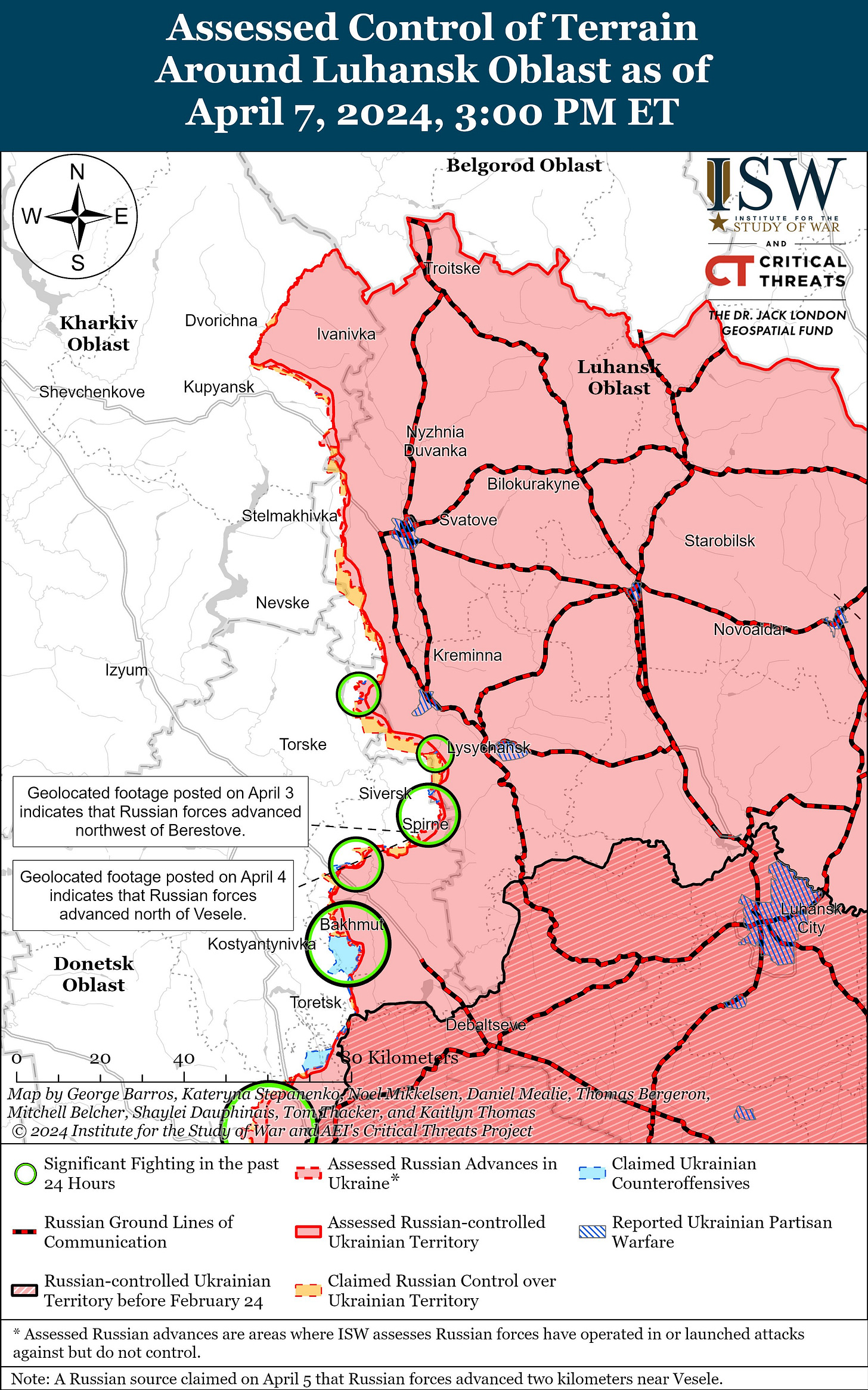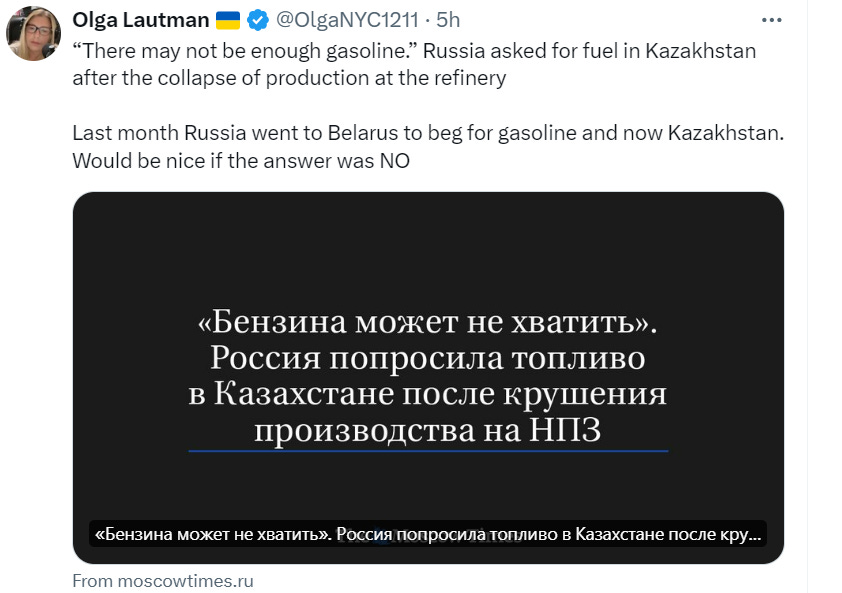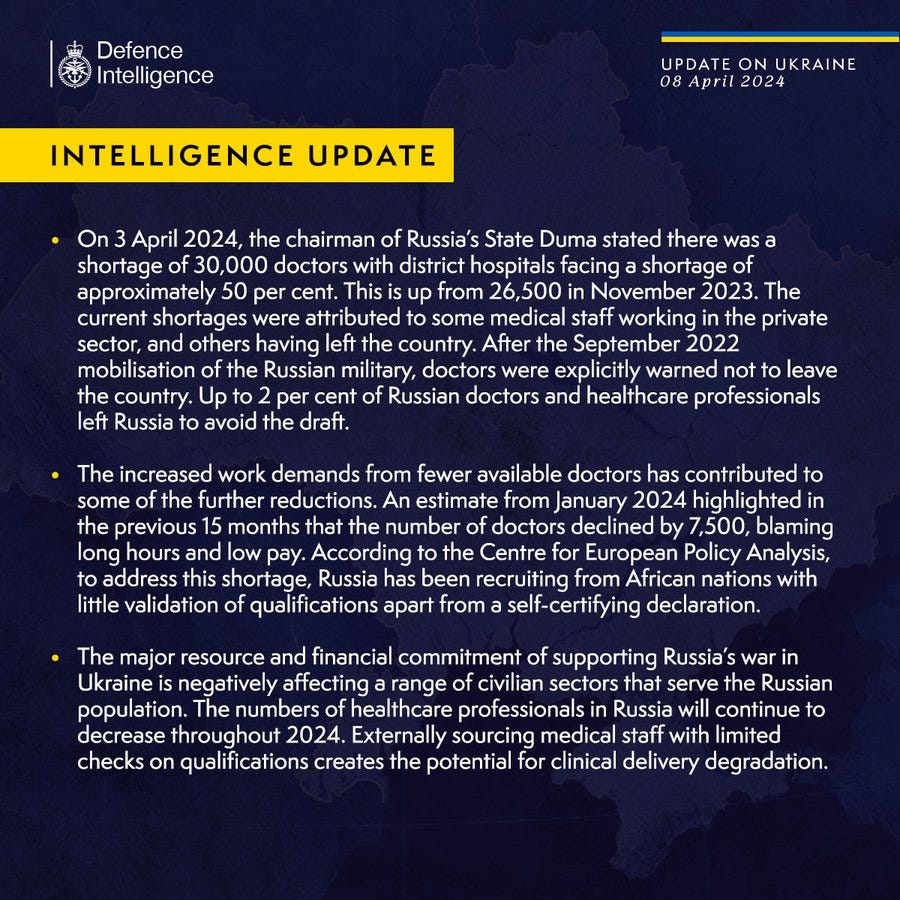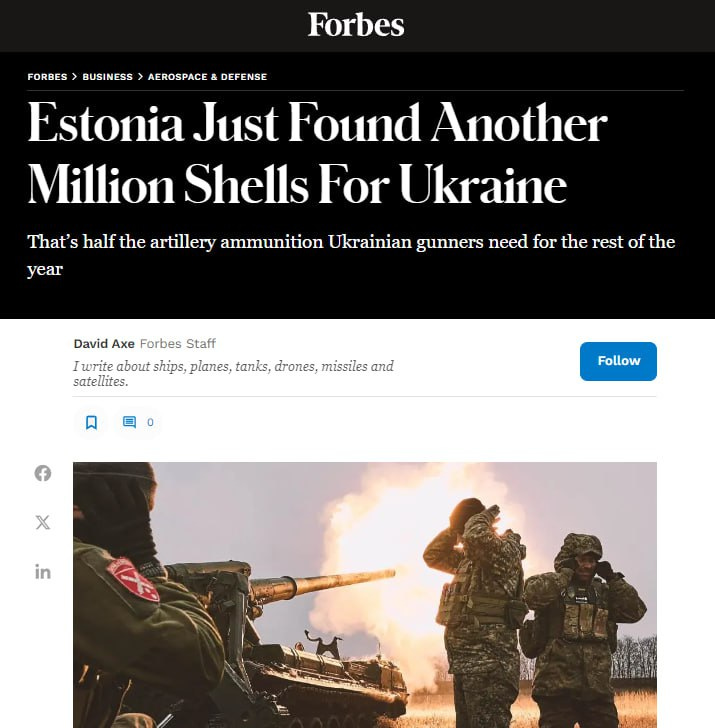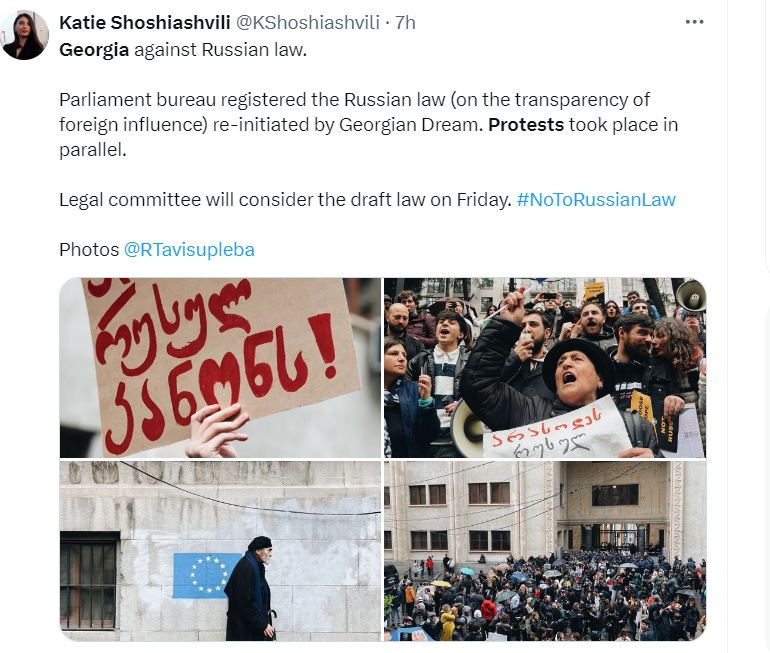Apr 9: E-Stories
RUattacks Kharkiv Sumy CombatSit BehindLines InRussia Allies Trump HoneyTrap Eclipse A&P UKDef Ukrinform ISW TimesRad IWP Aseyev Kokcharov Lautman Davis Politico Klain VSquare Shoshiashvili BBC
Catching up…
EA Worldview’s Ukraine Up-date- hop over to Scott’s amazing hourly Ukraine up-date page. I’ll fill in with some bits and bobs.
Mobile billboards were circling Reagan National Airport on Monday and will be in circulation as Congress arrives back in Washington DC.
Stories we’re following…
Russia dropped 4 guided bombs in the center of Bilopillya, Sumy region. One woman was killed and three people were wounded in the attack.
Governor: Russian attack on Zaporizhzhia Oblast kills 3, wounds 1. Russian troops launched Grad rockets at the town of Huliaipole in southeastern Zaporizhzhia Oblast, killing three civilians and wounding one, regional governor Ivan Fedorov reported on April 7.
Russia renews missile attacks on Kharkiv. Two attacks were reported so far on April 7, with most targets remaining undisclosed. One civilian was reported wounded so far.
President Zelensky’s evening address on Kharkiv:
The situation in Kharkiv is very harsh. Russian terror is constant. Russians began using guided aerial bombs against the city almost daily. We are looking for ways to increase Kharkiv's ability to protect the sky. This is a task for both our military and diplomats, who are in charge of international communication and must maintain daily dialogue with partners.
IAEA confirms 3 direct strikes on main reactor containment structures of Zaporizhzhia Nuclear Power Plant. The International Atomic Energy Agency (IAEA) confirmed that the main reactor containment structures of the Zaporizhzhia Nuclear Power Plant had suffered at least three direct strikes, IAEA Director General Rafael Grossi said on April 7.
Media: Ukrainian military intelligence denies involvement in drone explosion at Zaporizhzhia Nuclear Power Plant. "Ukraine is not involved in any armed provocations on the territory of the illegally occupied nuclear plant," the spokesperson Andrii Yusov said, adding that Russian false flag strikes were a frequent occurrence.
Minister: Ukraine needs advanced air defense to protect energy infrastructure. As Russia increased its attacks, the shortage of air defense systems in Ukraine became more tangible.
Combat Situation Update
The offensive of Russian troops is expected at the end of spring, at the beginning of summer. At the same time, the enemy's strategic direction is Pokrovsk, and an advance to Chasiv Yar in the Donetsk region is not excluded, GUR head Budanov said.
Russian troops advancing on Avdiivka axis - ISW
Russian invasion forces have advanced west of Avdiivka while positional battles continue in the Kreminna area region, northwest of Bakhmut, on the section of the administrative border of Donetsk and Zaporizhzhia regions, and near Krynky on the eastern bank of the Dnipro in Kherson region.
Source: Russia lost 7 aircraft in Ukraine's April 5 attack on air base. The HUR source said the Ukrainian drone attack damaged four Russian Sukhoi Su-30SM fighter jets, two transport aircraft, and one Beriev Be-200 Altair.
Ukrainian hackers destroy data center used by Russian defense industry enterprises, Gazprom, Rosneft
Ukrainian hackers, linked to the Ukraine’s Security Service (SBU) cyber department, have destroyed a data center used by Russian industrial giants. Among them are Gazprom, Lukoil, Telecom, and leading Russian defense industry enterprises.
Times Radio: As the West considers further sanctions on Putin's war economy NATO begins planning for arms support to Ukraine without US help. Speaking to Kate Gerbeau and James Hanson this week's Frontline experts outline how the war could end:
Timothy Ash, Economist and expert on Ukraine/Russia.
Behind the Lines
Germany scrambles fighter jets to intercept Russian aircraft flying over Baltic Sea. The fighter jets took off on April 6 from a base in Lielvarde, a Latvian town about 50 kilometers (about 31 miles) southeast of Riga.
The US Treasury Secretary has threatened sanctions on China’s banks which aid Russia’s military capacity, amid Russia’s diplomatic visit to China. She told reporters, as she wrapped up four days of talks with China, that “any banks that facilitate significant transactions that channel military or dual-use goods to Russia’s defence industrial base expose themselves to the risk of US sanctions.”
A member of the far-right Alternative for Germany (AfD) accused of taking money from a pro-Russian media site has denied any wrongdoing. German magazine Der Spiegel and Czech newspaper Denik N reported that Bystron had received money from the portal Voice of Europe, which was sanctioned by the Czech government late last month due to suspected Russian influence. Petr Bystron, a member of the German parliament and an AfD candidate in European parliament elections set for June, has “vehemently denied” the allegations, an AfD spokesperson told Reuters.
Meanwhile in Russia
Lavrov arrived in Beijing on Monday to display the strength of ties with close diplomatic ally China, amid Moscow’s war against Ukraine. Despite its backing of Russia in the Ukraine war, China’s foreign ministry spokesperson Mao Ning told reporters Monday that “China has an objective and fair position on the Ukraine issue … We have been actively promoting peace talks and political solutions. China is not a creator or party to the Ukraine crisis, and we have not and will not do anything to profit from it.”
Julia Davis: Meanwhile in Russia: Vladimir Solovyov insisted that Ukraine cannot be allowed to exist, explained why Russia should not negotiate with the West and promised, "We will kill all of them."
The Russian government has declared a federal emergency over record floods in the Orenburg region. The floods, caused by rising water levels in the Ural River, forced over 4,000 people to evacuate, and has flooded nearly 6,300 houses so far, according to state media. Flooding in two more nearby regions has been deemed “inevitable” by the Kremlin. Russian authorities have opened a criminal case for “negligence and violation of construction safety rules” over the burst dam. The Orenburg regional governor said specialists assessed that the dam was built “for a different weight” and that the level of rainfall was “exceptional”.
Protesters take to the streets in Orsk: Local residents are dissatisfied with the authorities failing to build infrastructure to protect the city from spring flooding:
More than 10,400 homes across Russia have been flooded, triggering record water levels in the Ural mountains, Russia’s emergency ministry have said. “An increase in air temperatures, active snow melt and river openings are predicted,” Russia’s emergency ministry said. “More than 10,400 residential buildings remain flooded in 39 regions.” Russia’s government declared a federal emergency on Sunday over flood-hit areas, state media reported.
In Vyazma, Smolensk region in Russia, a road bridge collapsed right on the railway tracks. Local media reports that piles of concrete fell directly onto the railway tracks and blocked train traffic, emergency services are on the scene. The bridge was supposed to be serviced in 2018. I guess they couldn’t get around to it.
The Washington Post learned about the 'plan' that Trump has/had to end the war within 24 hours, based on anonymous sources familiar with the matter. Trump’s plan reportedly involved pushing Ukraine to cede Crimea and Donbas to Russia. Trump’s campaign advisor dismissed the report as fake news, insisting that Trump will not settle on a peace plan until he is in office and can properly weigh all the options.
The chairman of the US House Intelligence Committee, Mike Turner (Republican), believes that Russian propaganda has penetrated the US legislature, as members of US Congress are spreading false information about the Russian invasion of Ukraine.
The Kremlin has warned that a planned German military presence in Lithuania would escalate tensions. The Nato military alliance and EU member Lithuania, which borders Russia and its ally Belarus, said earlier it would partly finance permanently hosting of 5,000 German troops from 2027. (Me: The Kremlin ALWAYS feels threatened.)
Allied Support
The Ministry of Energy of Lithuania offered to disassemble its closed thermal power plants into spare parts for the Ukrainian energy system, Ukrainian Energy Minister Herman Galushchenko reports.
Greece may transfer 32 F-16C/-D Block 30 to Ukraine while 24 Mirage 2000-5 could also end up in Ukraine. Selling to India is another option. As part of the Air Force reform plan 'Agenda 2030', Greece is planning to sell 108 fighter jets of various types.
Ukraine, eight other nations align with EU sanctions over Russian aggression
Ukraine and eight other nations from among candidate countries and members of the European Free Trade Area (EFTA) aligned with the decision of the EU Council of March 12, 2024, which expanded the list of persons and entities subject to EU sanctions for violation of sovereignty and territorial integrity of Ukraine, extending them for another six months, until September 2024.
European defense contractors have warned that dependence on Chinese cotton, which is used in munitions powder, is threatening their ability to expand production. There is also a shortage of nitrocellulose, another official said.
Canada filling the gap in support for Ukraine amid drop in U.S. aid - Freeland
"In March, Canada sent $2 billion in urgent budget financing support to Ukraine at a time when the U.S […] has been unable to step up and provide support for Ukraine. We were there to fill the gap," Canadian Finance Minister Chrystia Freeland
Foreign partners allocate over $700 million for demining in Ukraine. The U.S., Switzerland, Norway, EU countries, and Japan are among the key donors. The demining coalition for Ukraine includes about 20 countries. (Me: the most mined country is Afghanistan, and it is still dealing with this threat to civilians today.)
For Europe to be at peace, Russian imperialism must be stopped. We cannot allow for any “gray zones” because Putin sees them as an invitation to undermine territorial integrity and sovereignty, draw imaginary lines on the map and, ultimately, use military force. His full-scale invasion of Ukraine has also proven that a policy of concessions vis-à-vis Russia, in the hopes that it could bring peace or stability back to the Continent, is naive.
This is why European allies should shoulder their fair share of NATO’s collective burden and demonstrate readiness to take more responsibility for Europe’s defense. The enduring transatlantic bond remains the bedrock of our security, and we Europeans must address some of the most urgent shortcomings that have become painfully obvious during the past months and years: capability gaps, the readiness of our forces, production capacity, logistics, standardization and interoperability.
Politico: Lamborghini and Rolexes seized in massive EU police raid over €600M Covid fraud
Cops said the organized crime group used “advanced technologies” including AI to produce false documents for laundering cash.
Police on Thursday arrested more than 20 suspects in Italy, Austria, Romania and Slovakia as part of a major investigation into massive fraud linked to the EU’s post-pandemic recovery fund.
At the request of EU prosecutors, 150 officers from fraud and financial police units detained eight people, while another 14 were placed under house arrest following a cross-border probe into an alleged criminal organization suspected of defrauding €600 million from the EU’s Recovery and Resilience Facility (RRF) for Italy.
Police also raided homes and businesses seizing and freezing assets including apartments and villas, cryptocurrency, Rolex watches, gold and jewelry, as well as a Lamborghini, a Porsche and an Audi Q8.
VSquare Goulash: AUSTRIA’S SPAR FENDING OFF ORBÁN PROXIES’ ASSET GRAB ATTEMPTS
Hungary’s deteriorating rule of law and corruption not only affect EU funds — they’re now also threatening private investments. Recently, in a candid interview, Hans Reisch, head of the Spar Austria retail chain, revealed that they are withdrawing assets from Hungary for fear of expropriation. He openly spoke about the Hungarian government’s harassment and extortion, even sharing that Hungarian Prime Minister Viktor Orbán asked Spar to let one of his relatives become the Hungarian subsidiary’s shareholder. Moreover, the allegation is that the Orbán government uses an extra retail tax to force Spar to sell their Hungarian chain, consisting of more than 600 stores, to Orbán’s proxies. This phenomenon is not new. However, it’s rare that blackmailed foreign companies dare to go public with such Hungarian asset grab attempts. One of Orbán’s ministers even openly threatened Spar by saying: “The company will pay the price for what it has done in recent days.” Publicly, Orbán has long justified similar moves by stating that at least 50 percent of certain key sectors in the Hungarian economy should be under Hungarian ownership.
However, an Austrian source with knowledge of the attempt told me that more than a year ago, representatives of a Russian oligarch family living in Hungary were also approaching Spar with their Orbán-government backed bid – and got rejected. This family, the Rahimkulovs, is headed by Megdet Rahimkulov, a Kremlin-connected oligarch who was once Gazprom’s Hungarian representative. However, in recent years, the Rahimkulovs’ business connections were mostly cooperative in Orbán government circles. For example, they entered a real estate deal with the Prime Minister’s son-in-law, István Tiborcz, who sold two Austrian hotels to the Russians. Interestingly, according to my well-connected Hungarian business sources, Tiborcz was also the unnamed Orbán relative mentioned by Spar head Hans Reisch in connection with the takeover attempt. It seems the Rahimkulovs have also been closely coordinating with Viktor Orbán’s family since making their offer. (The Hungarian Prime Minister’s spokesperson, the Rahimkulov family and Spar Austria didn’t respond to my requests for comment.)
Protests in Hungary over the weekend. They have been on-going for the past few weeks.
7 takeaways from Westminster’s ‘honey trap’ sexting scandal
British politics has been unsettled by talk of honey traps and blackmail after more than a dozen men in U.K. politics were sent flirtatious messages on WhatsApp.
The messages from two suspicious mobile numbers to MPs, aides and journalists, revealed by POLITICO Wednesday, escalated in several cases to the sender sharing explicit images. In at least one case, a target reciprocated. Police are investigating and the House of Commons speaker has urged MPs to come forward if they’ve received similar messages.
In an astonishing twist Thursday night, Conservative MP William Wragg told the Times he had handed over the phone numbers of colleagues to a man he met on dating app Grindr who “had compromising things on me.” He will keep the Tory whip, but serious questions are being asked about his role.
POLITICO rounds up seven key points we’ve learned about the suspected “spear fishing” attack, a personalized form of “phishing,” meaning to gather compromising information on a victim.
The US House is set to reconvene, and all eyes are on House Speaker Johnson. Will he put Ukrainian aid up for a vote while Rep. Marjorie Taylor Greene threatens to force a vote on his ouster. Johnson vowed to focus on Ukraine right after the recess.
Jake Tapper: “Sen Mike Turner tells me it's "absolutely true" that Russian propaganda has "infected" a portion of the GOP base, calling out "anti-Ukraine and pro-Russia messages, some of which we even hear being uttered on the House floor."
The Guardian: Donald Trump was ready on Monday to sue the judge in his New York hush-money case a week before the start of the much-anticipated trial, the New York Times reported, detailing yet another attempt by the former president to delay legal proceedings against him.
Dr Jack Dziak at IWP: The Art of Provocation
Dr. Jack Dziak is a consultant in the fields of intelligence, counterintelligence, counter-deception, and national security affairs. He has served over five decades as a company president and as a senior intelligence officer and senior executive in the Office of the Secretary of Defense and in the Defense Intelligence Agency, with long experience in counterintelligence, hostile deception, counter deception, strategic intelligence, weapons proliferation intelligence, and intelligence education.
Revolutionary history abounds with ruse, deception, disinformation, manipulation, diversion, and a variety of devious mechanisms in the struggle by political visionaries, from gnostics to secret societies to anarchists to Marxists and others, to impose their utopian schemas on the unsuspecting. A technique encompassing that genre of mayhem that stands out and has been raised to the level of art is provocation (provokatsiya in the Russian). Provocation was a mainstay of the Tsarist counterintelligence service, the Okhrana, and then perfected up to the strategic level by the Soviet security services from the Cheka, through the KGB, and now to the FSB, SVR, the GRU of the Russian Federation. And, of course, it prospers in other counterintelligence-state cultures as well, such as Islam and China.
Simply put, provocation is a key element of political warfare and is a characteristic of the counterintelligence-state. Provocation connotes operational counterintelligence techniques that create conditions to instigate real or imagined opponents -- especially notional ones -- into some action that will further the state’s objectives at the expense of the opponent(s). The idea here is to instigate something that otherwise would not occur, control the opponent, and ultimately put him out of action – or, better yet, keep controlling him long-term for some other political or operational purpose. This may be at the tactical level (a double agent operation aimed at discrediting an enemy intelligence service) or at the strategic level (the Trust and WiN operations focused on both domestic enemies and foreign intelligence services simultaneously).






